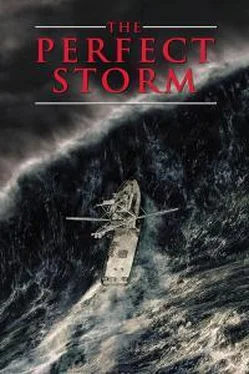Sebastian Junger - The Perfect Storm
Здесь есть возможность читать онлайн «Sebastian Junger - The Perfect Storm» — ознакомительный отрывок электронной книги совершенно бесплатно, а после прочтения отрывка купить полную версию. В некоторых случаях можно слушать аудио, скачать через торрент в формате fb2 и присутствует краткое содержание. Жанр: Триллер, Проза. Описание произведения, (предисловие) а так же отзывы посетителей доступны на портале библиотеки ЛибКат.
- Название:The Perfect Storm
- Автор:
- Жанр:
- Год:неизвестен
- ISBN:нет данных
- Рейтинг книги:3 / 5. Голосов: 1
-
Избранное:Добавить в избранное
- Отзывы:
-
Ваша оценка:
- 60
- 1
- 2
- 3
- 4
- 5
The Perfect Storm: краткое содержание, описание и аннотация
Предлагаем к чтению аннотацию, описание, краткое содержание или предисловие (зависит от того, что написал сам автор книги «The Perfect Storm»). Если вы не нашли необходимую информацию о книге — напишите в комментариях, мы постараемся отыскать её.
The Perfect Storm — читать онлайн ознакомительный отрывок
Ниже представлен текст книги, разбитый по страницам. Система сохранения места последней прочитанной страницы, позволяет с удобством читать онлайн бесплатно книгу «The Perfect Storm», без необходимости каждый раз заново искать на чём Вы остановились. Поставьте закладку, и сможете в любой момент перейти на страницу, на которой закончили чтение.
Интервал:
Закладка:
Presumably, then, Billys radios are out. The Coast Guard never receives a call. Now his only link to the rest of the world is his EPIRB, which sits outside in a plastic holster on the whaleback deck. It's about the size of a bowling pin and has a ring switch that can be set to "off," "on," or "armed." EPIRBs are kept permanently in the "armed" position, and if the boat goes down, a water-sensitive switch triggers a radio signal that gets relayed by satellite to listening posts on shore. The Coast Guard immediately knows the name of the boat, the location, and that something has gone disastrously wrong. If a boat loses her radios before actually sinking, though, the captain can send a distress signal by just twisting the ring switch to the "on" position. It's the same as screaming "mayday" into the radio.
Billy doesn't do it, though; he never trips the switch. This can only mean one thing: that he's hopeful about their chances right up until the moment when they have no chance at all. He must figure that the kind of sea that took out their windows probably won't hit again—or that, if it does, they'll be able to take it. Statistically a forty-knot wind generates thirty-or forty-foot breaking sea every six minutes or so—greenwater over the bow and whitewater over the house. Every hour, perhaps, Billy might get hit by a breaking fifty-footer. That's probably the kind of wave that blew out the windows. And every 100 hours, Billy can expect to run into a nonnegotiable wave—a breaking seventy-footer that could flip the boat end over end. He's got to figure the storm's going to blow out before his hundred hours are up.
Everyone on a sinking boat reacts differently. A man on one Gloucester boat just curled up and started to cry while his shipmates worked untethered on deck. The Andrea Gail crew, all experienced fishermen, are probably trying to shrug it off as just another storm— they've been through this before, they'll go through it again, and at least they're not puking. Billy's undoubtedly working too hard at the helm to give drowning much thought. Ernie Hazard claims it was the last thing on his mind. "There was no conversation, just real businesslike," he says of going down off Georges Bank. "You know, 'Let's just get this thing done.' Never any overwhelming sense of danger. We were just very, very busy."
Be that as it may, certain realities still must come crashing in. At some point Tyne, Shatford, Sullivan, Moran, Murphy, and Pierre must realize there's no way off this boat. They could trigger the EPIRB, but a night rescue in these conditions would be virtually impossible. They could deploy the life raft, but they probably wouldn't survive the huge seas. If the boat goes down, they go down with it, and no one on earth can do anything about it. Their lives are utterly and completely in their own hands.
That fact must settle into Bobby Shatford's stomach like a bad meal. It was he, after all, who had those terrible misgivings the day they left. That last afternoon on the dock he came within a hair's breadth of saying no—just telling Chris to start up the car and drive. They could have gone back to her place, or up the coast, or anywhere at all. It wouldn't have mattered; he wouldn't be in this storm right now, and neither would the rest of them.
It would have taken Billy at least a day to replace him, and right now they'd still be east with the rest of the fleet.
The previous spring Bobby and Chris rented a movie called The Fighting Sullivans, about five brothers who died on a U.S. Navy boat during World War Two. It was Ethel's favorite movie. Sitting there with Chris, watching the movie, and thinking about his brothers,
Bobby started to cry. He was not a man who cried easily and Chris was unsure what to do. Should she say something? Pretend not to notice? Turn off the TV? Finally, Bobby said that he was upset by the idea of all his brothers fishing, and that if anything happened to him, he wanted to be buried at sea. Chris said that nothing was going to happen to him, but he insisted. Just bury me at sea, he said. Promise me that.
And now here he is, getting buried at sea. The conditions have degenerated from bad to unspeakable, Beaufort Force 10 or 11. The British Manual of Seamanship describes a Force 10 gale as: "Foam is in great patches and is blown in dense white streaks along the direction of the wind. The rolling of the sea becomes heavy and shock-like." Force 11 is even worse: "Exceptionally high waves, small or medium-sized ships might be lost from view behind them. The sea is completely covered with long patches of white foam." Hurricane Grace is still working her way north, and when she collides with the Sable Island storm—probably in a day or so—conditions will get even more severe, maybe as high as Force 12. Very few boats that size can withstand a Force 12 gale.
Since Billy presumably can't use his radio, there's no way to know how things are going aboard the Andrea Gail. A fairly good idea, though, can be had from the Eishin Maru
78, the Japanese longliner two hundred miles to the southwest. The Eishin Maru has a Canadian observer on board, Judith Reeves, who is charged with making sure the vessel abides by Canadian fishing regulations. The storm hits the Eishin Maru around the same time as the Andrea Gail, but not as abruptly; buoy #44137, sixty miles to the south, shows a slow, gradual increase in windspeed starting at five PM on the 28th. By dawn on the 29th, the wind is forty knots gusting to fifty, and peak wave heights are only forty-five feet. That's considerably less than what Billy is experiencing, but it just keeps getting worse.
By midnight sustained windspeeds are fifty knots, gusts are hitting sixty, and peak wave heights are over one hundred feet. At ten past eight at night, October 29th, the first big wave hits the Eishin Maru.
It blows out a portside window with the sound of a shotgun going off. Water inundates the bridge and barrels down the hallway into Reeves's room. She hears panicked shouts from the crew and then orders that she doesn't understand. Men scramble to board up the window and bail out the water, and within an hour the captain has regained control of the bridge. The boat is taking a horrific beating, though. She's 150 feet long—twice the size of the Andrea Gail—and waves are completely burying her decks. There are no life jackets on hand, no survival suits, and no EPIRB. Just before dawn, the second wave hits.
It blows out four windows this time, including the one with plywood over it. "All the circuits went, there was smoke and wires crackling," says Reeves. "We crippled the ship. The VHF, the radar, the internal communication system, the navigation monitors, they were all rendered inoperable. That's when the radio operator came to me and said—in sign language—that he wanted me to go into the radio room."
The radio operator had managed to contact the ship's agent by satellite phone, and Reeves is put on the line to explain what kind of damage they've sustained. While she's talking, Coast Guard New York breaks in; they've been listening in on the conversation and want to know if the Eishin Maru needs help. Reeves says they've lost most of their electronics and are in serious trouble. New York patches her through to the Coast Guard in Halifax, and while they're discussing how to get people off the boat, the radio operator interrupts her. He's pointing to a sentence in an English phrase book. Reeves leans in close to read it: "We are helpless and drifting. Please render all assistance.” (Unknown to Reeves, the steering linkage has just failed, although the radio operator doesn't know how to explain that to her.) Its at this moment that Reeves realizes she's going down at sea.
"We had no steerage and we were right in the eye of the storm," she says. "It was a confused sea, all the waves were coming from different directions. The wind was picking up the tops of the waves and slinging them so far that when the search-and-rescue plane arrived, we couldn't even see it. The whole vessel would get shoved over on its side, so that we were completely upside-down. If you get hit by one wave and then hit by another, you can drive the vessel completely down into the water. And so that second before the vessel starts to come up you're just holding your breath, waiting."
Читать дальшеИнтервал:
Закладка:
Похожие книги на «The Perfect Storm»
Представляем Вашему вниманию похожие книги на «The Perfect Storm» списком для выбора. Мы отобрали схожую по названию и смыслу литературу в надежде предоставить читателям больше вариантов отыскать новые, интересные, ещё непрочитанные произведения.
Обсуждение, отзывы о книге «The Perfect Storm» и просто собственные мнения читателей. Оставьте ваши комментарии, напишите, что Вы думаете о произведении, его смысле или главных героях. Укажите что конкретно понравилось, а что нет, и почему Вы так считаете.












